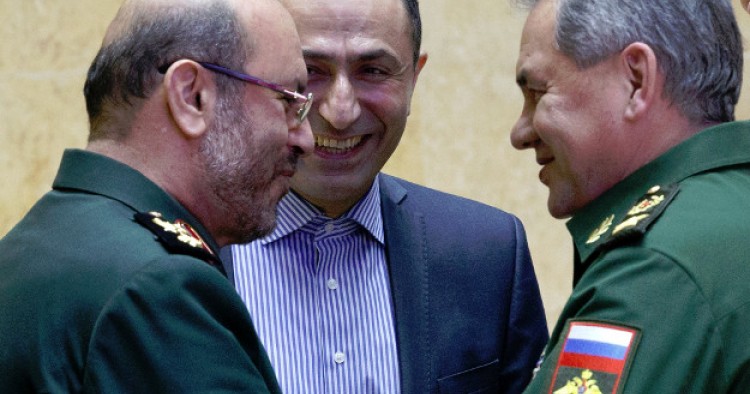Iran’s Defense Minister Brigadier General Hossein Dehghan arrived in Russia earlier today to participate in the 6th Moscow Conference on International Security (MCIS) scheduled for April 26 and 27, the Iranian media reports. The Russian defense and foreign ministers as well as the head of the country's Security Council will present Russia’s vision of world affairs at the conference. Dehghan is also scheduled to speak at the event on April 26. Iranian state-run media outlets claim that Russia’s inviting Iran to the summit indicates the Islamic Republic has become a major international player and that Tehran and Moscow are determined to further bolster bilateral defense ties. “Iran’s presence in the forum, the main goal of which is combating terrorism, will be an indication of the two countries' resolve for bilateral defense cooperation and growing regional convergence as they have taken common anti-terror strategies in the Middle East,” wrote the Islamic Republic News Agency.
According to Tasnim News Agency, Dehghan will meet with his Russian counterpart Sergey Shoygu on the sidelines of the conference to discuss ways to further strengthen bilateral defense ties as well as to coordinate on resolving regional and international issues. The defense ministers of Iran, Russia and Syria will also hold a separate trilateral meeting to coordinate efforts in the Syrian war.
Comment: Relations between Iran and Russia have significantly improved in the past two years. The two countries have been coordinating closely in the Syrian war and are boosting defense ties. Since the lifting of nuclear-related international sanctions on Iran in January 2016, Iran has received advanced weapons from Russia, including the long-delayed S-300 missile defense system. Moscow and Tehran are also negotiating the supply of around $10 billion worth of arms and military hardware to Iran. The deal reportedly includes T-90 tanks, artillery, planes and helicopters.
The U.S. retaliatory strikes in Syria earlier this month appear to have brought Tehran and Moscow even closer – although this may change in the long term as their vital interests and endgame strategy in Syria are not the same. Now that the regime of Bashar al-Assad is in control of key urban population centers, Russia is apparently seeking to reduce its military role and find a political solution to end the conflict in Syria. Iran, however, still favors a military victory and seeks to consolidate the presence of its proxies there for its broader regional agenda – mainly against Israel. Iran controls most of the powerful militia groups fighting in Syria and can undermine any Russia-led or U.N.-sponsored peace efforts.
Iranian leaders were recently worried that Russia might betray Iran and strike a deal with Washington over Syria. But now they are seeking to capitalize on widening rift between Washington and Moscow to prolong Russian military involvement in Syria and purchase advanced weaponry from Russia.
The Middle East Institute (MEI) is an independent, non-partisan, non-for-profit, educational organization. It does not engage in advocacy and its scholars’ opinions are their own. MEI welcomes financial donations, but retains sole editorial control over its work and its publications reflect only the authors’ views. For a listing of MEI donors, please click here.













